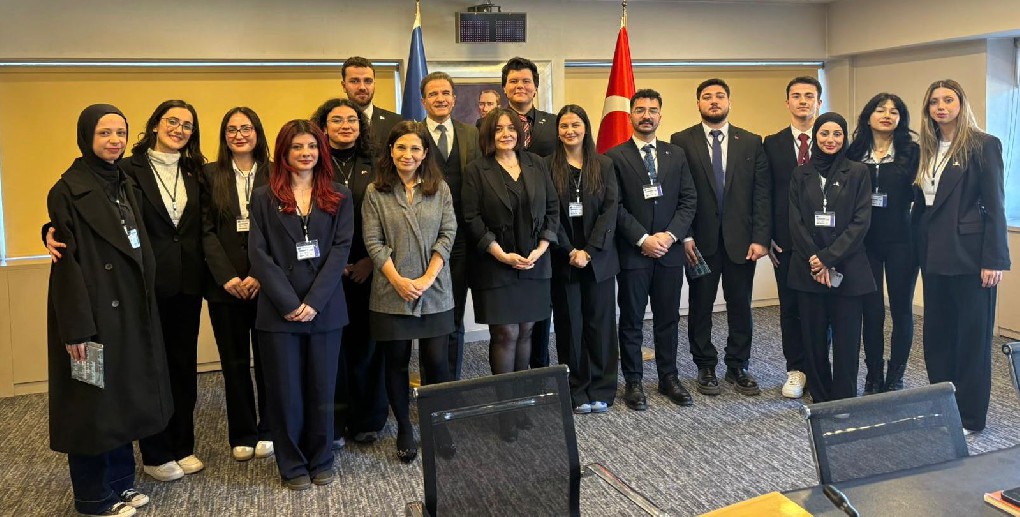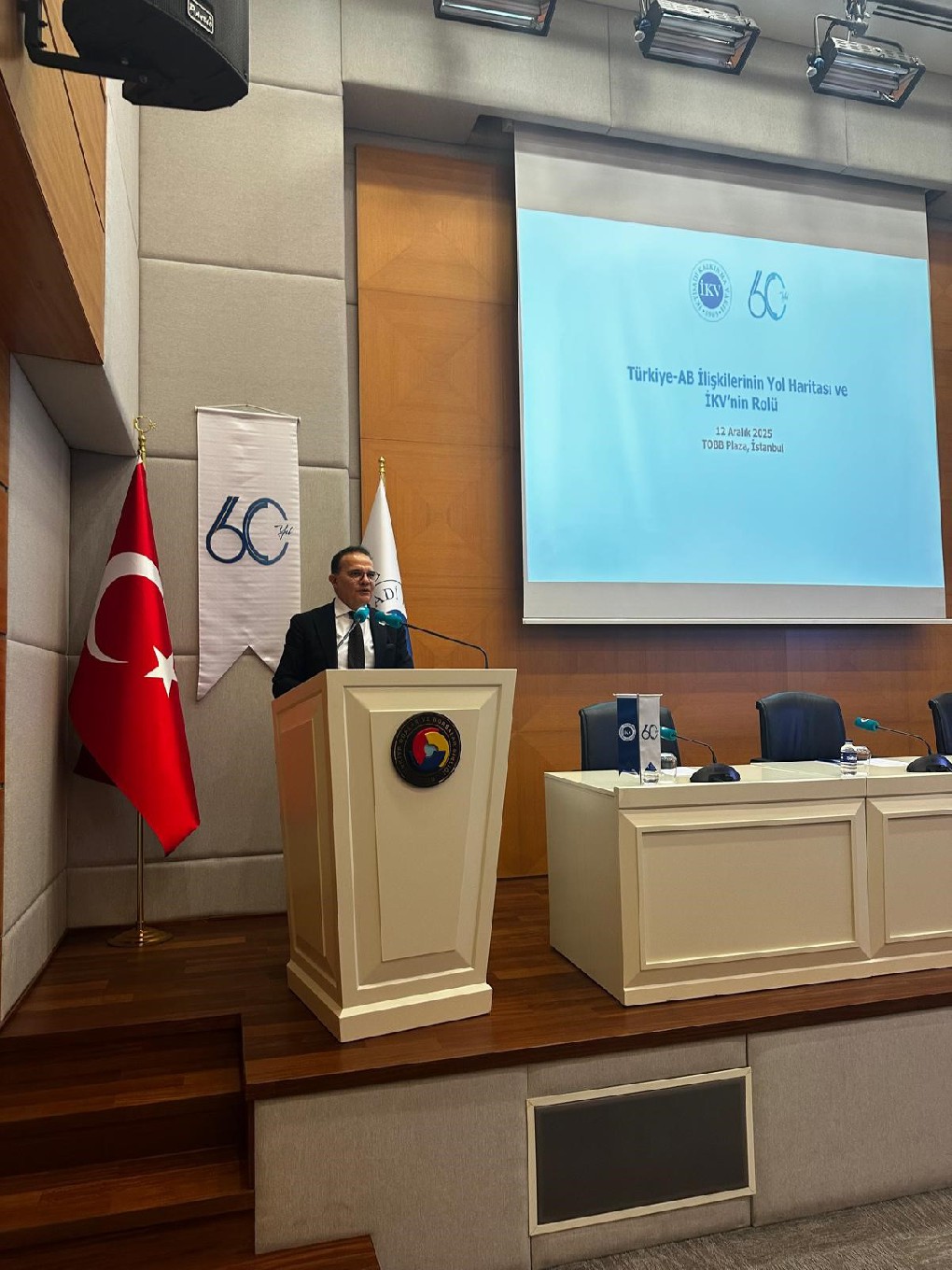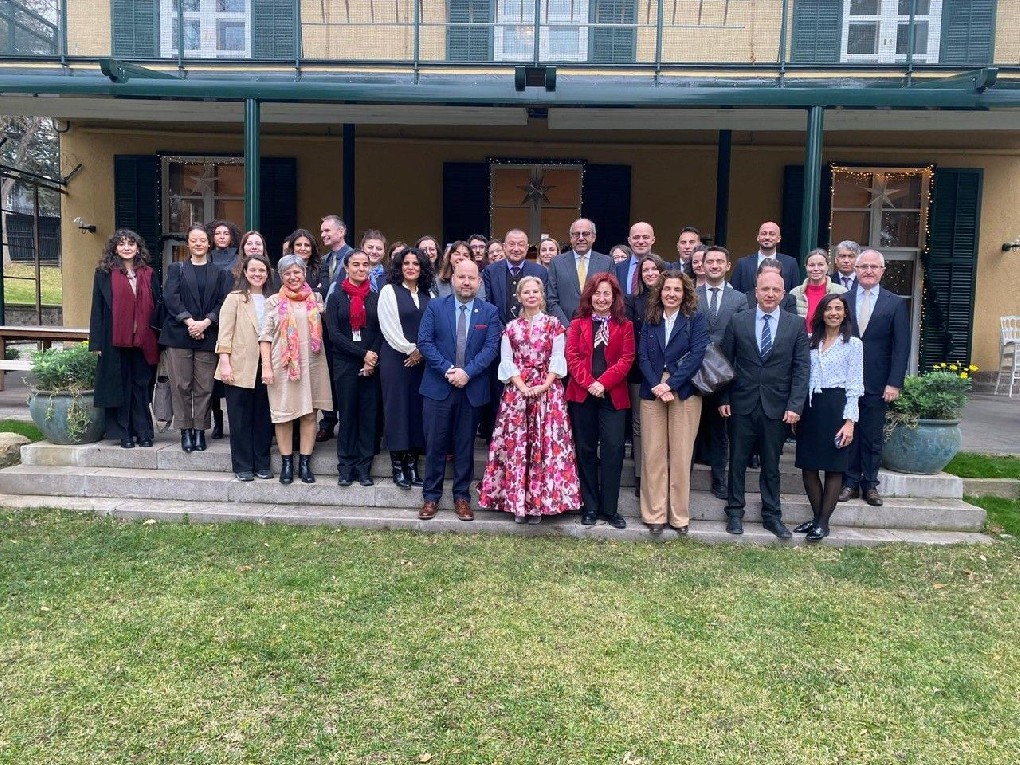- HOMEWelcome
- DIRECTORATE FOR EU AFFAIRSStructure
- E.U.Structure
- TÜRKİYE-EU RELATIONS
- History of Türkiye- EU Relations
- Main Documents
- Agreements
- Protocols
- Accession Partnership Documents
- National Programmes for the Adoption of the Acquis (NPAA)
- Türkiye Reports Prepared by the European Commission
- Enlargement Strategy Papers
- Türkiye’s National Action Plan for the EU Accession
- Türkiye’s National Action Plan for the EU Accession (2021-2023)
- Association Council Decisions
- Documents on Türkiye-EU Summits
- Institutional Structure
- Customs Union
- Türkiye- EU High Level Dialogue Meetings
- DATASources
- MEDIANews
- CONTACTContact Us
Deputy Minister of Foreign Affairs and Director for EU Affairs Ambassador Faruk Kaymakcı’s article published in the USOP Journal
Deputy Minister of Foreign Affairs and Director for EU Affairs Ambassador Faruk Kaymakcı’s article on the European Green Deal was published in the 5th issue of USOP Journal, which was issued with the theme of “The European Green Deal and Its Repercussions”.
Sector at a Glance - the Overview
Announced by the European Union (EU) in late 2019, the European Green Deal (EGD) is a comprehensive transformation and growth plan aiming to turn the wheels of the economy without putting pressure on the environment and climate. The EGD is more than a mere environmental and climate strategy - It is based on an understanding that encompasses all sectors of the economy and aims at restructuring production, consumption and employment patterns from a "green transformation" perspective. The EGD intends to make Europe the world's first climate-neutral continent by 2050 and also introduces regulations to protect the competitiveness of the EU economy and the functioning of the Single Market.
It is safe to say that the EGD emerged as a result of the process driven by the Paris Agreement at a time when, accompanied by greater public pressure, the effects of climate change are gradually exerting their presence.
The EGD is a viable socioeconomic transformation plan and is implemented in different fields ranging from energy to transportation and agriculture to industry through sectoral strategies, legislative changes and financial instruments adopted one after the other. As part of this dynamic process that is still being shaped within the EU, it is required to review all policy areas in line with the EU's climate targets and make the necessary changes. Lying at the heart of the post-pandemic EU economic recovery process is the promotion of sustainable, digital and green investments based on the EGD.
As a candidate country for the European Union and a partner of the Customs Union, Türkiye is an indispensable player in the green transformation process set forth by the EGD. It seems inevitable that this radical transformation will have significant effects on our country's harmonization with the EU acquis and its commercial relations with the European Union. On that note, the national EGD Action Plan was drafted under the guidance of our Directorate for EU Affairs and the auspices and coordination of our Ministry of Trade and with the contributions of the relevant public and private sector stakeholders. The Action Plan was publicly shared on 16 July 2021. The EGD Action Plan includes a total of 32 goals and 81 actions under 9 main headings[1]. We believe it will guide our country's harmonization efforts in the field of green transformation.
Our country became a party to the Paris Agreement as of 10 November 2021 and announced its net zero carbon emissions target until 2053 will accelerate the implementation process of our EGD Action Plan. In addition, we believe that the Türkiye-EU High Level Climate Dialogue, established between Türkiye and the EU and the second meeting of which is planned to be held in early 2022, will strengthen our country's cooperation with the EU in the context of harmonization with the EGD.
In the transportation sector, we are closely following the EU's efforts to support a sustainable, intelligent and environmentally-friendly transportation policy in line with the EGD goals. In this context, the "Sustainable and Smart Mobility Strategy" was published by the European Commission on 9 December 2020, and targets were set in order to realize the green and digital transformation of the EU transportation system and make it more resilient against future crises. As a result of this strategy and as stated in the EGD, a 90% reduction in emissions will be achieved by 2050 via an intelligent, competitive, safe, accessible and affordable transportation system. Intelligent transportation systems, sustainable mobility plans and alternative fuels stand out as key matters.
On the other hand, the “Fit For 55” package was adopted in July 2021. The said package aims to ensure that almost all cars and pickup trucks on roads become zero-emission vehicles by 2050, and the greenhouse gas emissions from road transport are neutralized. Furthermore, the year 2021 was declared as the "European Railway Year", a catalyst for the initiatives to increase the share of railway transport in the transportation sector and to boost interest in railway transport.
On that note, four recommendations were adopted on 14 December 2021 to support a sustainable, intelligent and environmentally-friendly transport policy. These recommendations aim to strengthen EU-wide mobility, increase the share of railway and inland waterway transport in freight and passenger transportation, support the dissemination of charging stations, alternative refueling infrastructure and new digital technologies, facilitate multimodal transport and expand sustainable urban mobility. The revitalization of the existing Türkiye-EU High Level Transport Dialogue mechanism is of great importance for both our country and the EU to achieve successful results from joint efforts. It is important to note that Türkiye is a key country to Europe’s connectivity.
In line with the foregoing aims and objectives of the EU, major projects have been carried out in our country within the scope of the EU Instrument for Pre-accession Assistance (IPA). In the IPA 2007-2013 period, the construction of three major railway projects was successfully completed by our Ministry of Transport and Infrastructure to increase the share of railway transport in the transportation sector. Similarly, the construction of Halkalı-Kapıkule Railway Line Project continues apace. This project is dubbed the flagship project for the IPA 2014-2020 period in terms of the grant amount and will connect Türkiye to the EU countries via the Trans-European Transport Networks (TEN-T).
Sustainable urban mobility planning (SUMP) and intelligent transportation systems play a key role among the transportation sector priorities for the IPA 2014-2020 period. Preliminary project studies in the aforementioned areas are coordinated by our Ministry of Transport and Infrastructure and are nearing an end. These projects are due for implementation in the near future. SUMP projects will ensure the preparation of safe, secure, gender-equal, and financially accessible and affordable transportation plans in our cities in line with the implementations of the EGD goals and will guide relevant future investments by our municipalities.
Undoubtedly, one of the sectors that will benefit most from EU funds in the IPA 2021-2027 period is transportation. A closer look at the sub-headings of the thematic priority of transportation shows that the themes standing out as compatible with the EGD priorities include, inter alia, ensuring intelligent, environmentally-friendly, sustainable, inclusive and safe transportation, developing public transportation and shared transportation systems, supporting green transportation, marine and railway transportation. The future projects favoring these priorities in the upcoming period will contribute to the harmonization efforts we will deliver in the field of green transformation.
Apart from the projects financed by IPA funds, various successful projects supporting the transportation sector in our country were completed in the last seven years as part of the EU Programs (Union Programs). Partnerships developed by our competent institutions such as TCDD, Directorate General of Highways in comprehensive and qualified projects such as SENSKIN, which develops advanced bridge maintenance technologies, and IN2TRACK, which develops low-cost and high-capacity railway infrastructures, gave us courage and enthusiasm for the next seven years.
In the coming period, there are many Union Programs that can be utilized towards the goal of green and intelligent transportation. Among these, the first that comes to mind is the Horizon Europe program, the world's largest civil research and innovation program. The program will be implemented with a total budget of EUR 95.5 billion between 2021 and 2027 and has been structured with a focus on green and digital transformation. The total budget of the calls issued under the “Climate, Energy and Mobility Cluster” of the Horizon Europe program for the years 2021 and 2022 alone is approximately worth EUR 900 million. Similarly, it is possible to work on joint projects with Europe's leading companies, universities and institutions, thanks to European Partnerships aiming to transform the transportation sector through a cooperation of the public and private sectors. In addition, we can be a part of Europe's ambitious goal of transformation in the field of urban mobility via the Urban Mobility Information and Innovation Community under the European Institute of Innovation and Technology (EIT Urban Mobility KIC), which will provide EUR 400 million in joint funding between 2022 and 2026. Accordingly, it would be a more accurate point of view to consider the Union Programs not only as grant resources that offer project support, but as opportunities that will provide access to best examples for our public and private sector organizations, enable us to become stakeholders of international networks and make the potential for inter-sectoral synergy more visible. These joint efforts and projects also strengthen our country's position on the path to EU membership.
It is important for our country to comply with the new and high standards to be introduced by the EU and to monitor and track developments. At the Ministry of Foreign Affairs Directorate for EU Affairs, we will continue to closely monitor the EU acquis and policies in the transportation sector and extend the required support to our institutions to that end.
Please click here to read the journal.






